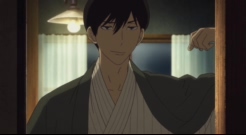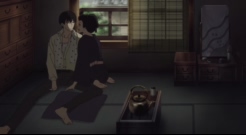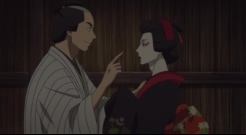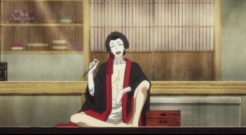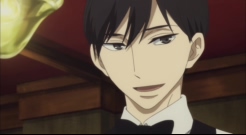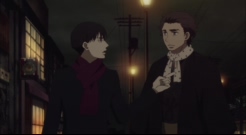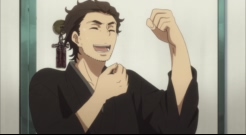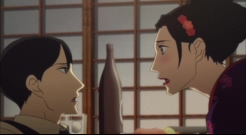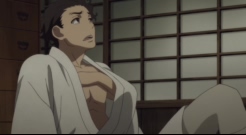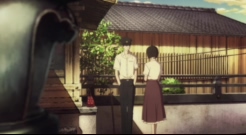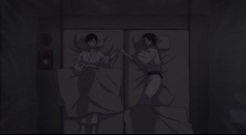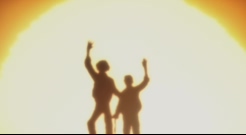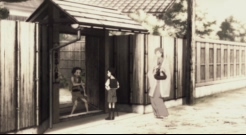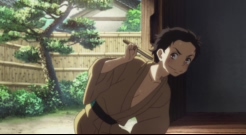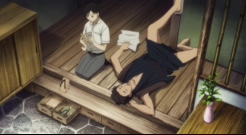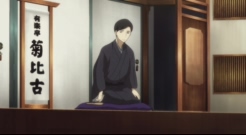Congratulations Yakumo. You finally discovered your spark for Rakugo. And all you needed to do was dress up like a woman to do it. This may harken back to what his master said, his Rakugo is too perfect. So this play put on by Rakugo performers was really the thing he needed. By dressing him up like a woman they placed him in a vulnerable position, so much so that he was getting cold feet beforehand. Sukeroku’s advice was the turning point to make Yakumo recognize the audience. I believe that before Yakumo treated his Rakugo as a job, systematically reading his lines without taking the audience into account. With this play they stripped him bare and forced him to pay attention to the eyes watching him. With that we have Yakumo awakened, hitting his Stride at the finale of the play where we see the man we saw at the beginning of the series. Even bringing out the characteristic pipe he will use in his future performances.
Though what amuses me is just how oddly sexual his realization was. Throughout the performance Yakumo was constantly remarking at people watching him, and his remarks sound much like those of an exhibitionist. Coming from someone so disinterested in relationships it’s a rather odd, but it does make sense that his Rakugo would improve from this as it was often commented that he would work well with racy stuff. You could argue that this could be a sign of him “coming out of the closet” so to speak but I would disagree. What seemed to really excited Yakumo was the feeling of control he had over the audience. He did comment on how he could change their focus just by a simple movement. It’s funny to put this in a positive way but I believe Yakumo has learned the joy of manipulation.
Miyokichi and Yakumo’s relationship remains a mysterious attraction. Miyokichi’s desire for him looks genuine but I believe she is aware that he’s rather reluctant. So her advances are forceful, often pushing Yakumo to be with her. Yakumo’s feelings seem a lot more subdued. I believe he cares for her but not on the level she desires. The fact that he’s willing to open up to her about his insecurities and not to Sukeroku shows that he does hold her close. I am having trouble discerning if he’s really sexually attracted to her as while Miyokichis advances are pushed on him, he’s hardly putting up much of a fight. It’s possible that he does desire her but he puts Rakugo above those feelings. Maybe Miyokichi is aware of that and making him get out of his own way? Either way it does seem like Yakumo finds women bothersome, which only makes him all the more popular. Though I don’t think that’s a case for him being homosexual as he seems equally apathetic about men. Besides Sukeroku, Yakumo doesn’t look to have many acquaintances. From my deduction, I would say he prefers solitude in his life which is mindset I can certainly relate to.

